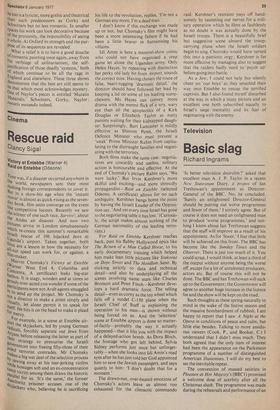Cinema
Rescue raid
Clancy Sigal
victory at Entebbe (Warner 4) Raid on Entebbe (Odeons) Time was, if a disaster occurred anywhere in the world, newspapers sent their most clashing foreign correspondents to cover it. 8ut in a show-biz age when the 'instant ,11113vie' is almost as quick-rising as the seven', aY book, film units converge on the event like competitive locusts. Recently we saw t,Ile winner of one such race, Survive!, about tne Andes air disaster. And now two Pictures arrive in London simultaneously which re-create this summer's remarkable Israeli rescue of 106 hijacked Jews at Uganda's airport. Taken together, both n!,ms are a lesson in how the necessity for !"-nut speed can work for, or against, a nhn-maker. ,,Marvin Chomsky's Victory at Entebbe marner West End 4, Columbia and C, Mecenta, A certificate) leaks big-star °athos. It is stagy, wooden and at times so er°sslY over-acted you wonder if some of the Participants were not Arab agents smuggled in 10 send up the project. Mr Chomsky is tivi°1 a director to make a point simply and itsuallY. let alone permit it to speak for :self. He hits it on the head to make it plead 'or mercy.
For example, in a scene at Entebbe air port the skyjackers, led by young German Ar rad: icals, forcibly separate out Jews from
Yans before releasing the latter as part of "let!' strategy to pressurise the Israeli r,vernmznt into freeing fifty-three of their ,4ned terrorist comrades. Mr Chomsky 'I'zlal(es a big wet deal of the selection process a.savving away at his tear-jerking violins te hostages sob and an ex-concentration 0:1)1) victim among them draws the historic Arallel for us. it's the same,' the former Sky' prisoner accuses one of the yiackers who, believing he is sacrificing
his life to the revolution, replies, 'I'm not a German any more, I'm a dead man.' I don't know if this exchange was made up or not, but Chomsky's film might have been a more interesting failure if he had been a little braver in humanising his villains. Idi Amin is here a minstrel-show comic who could not have organised a crap game let alone the Ugandan army. Only Helen Hayes, by repeating with distinction her perky old lady bit from Airport, sounds the correct note. Having chosen the route of false, heart-tugging 'dramatic detail,' the director should have followed her lead by keeping a lid on some of his leading scene chewers. Ms Hayes can convey more drama with the merest flick of a wry, wary eye than all the apoplectics of a Kirk Douglas or Elizabeth Taylor as nutty parents waiting for their kidnapped daughter. Surprisingly, Burt Lancaster is mildly
effective as Shimon Peres, the Israeli Defence Minister who must prevent a 'weak' Prime Minister Rabin from capitulating to the distraught families and negotiating with the terrorists.
Both films make the same case: negotiations are cowardly and useless, military action is honourable and effective. At the end of Chomsky's picture Rabin says, 'We were lucky.' But Irvin Kershner's more skilful and exciting—and more shrewdly propagandist—Raid on Entebbe (selected Odeons, A certificate) allows for no such ambiguity. Kershner bangs home the point by having the Israeli Leader of the Opposition say, 'And yet every time Israel has gone to the negotiating table it has lost.' (Curiously, the script makes almost nothing of the German nationality of the leading terrorists.) For Raid on Entebbe Kershner reaches back, past his flabby Hollywood epics like The Return of a Man Called Horse, to his early documentary training which helped him make lean little pictures like Stakeout on Dope Street and The Hoodlum Saint. By sticking strictly to data and technical detail—and also by underplaying all the scenes involving name stars like Charles Bronson and Peter Finch—Kershner develops a hard dramatic force. The telling detail—even as corny as the toy wheel which
falls off a model C-150 plane when the Israeli Chief of Staff is explaining the
operation to his men—is shown without being forced on us. And the 'selection' scene at Entebbe airport is done so matter of-factly—probably the way it actually happened—that it hits you with the impact of a delayed-action bomb. As Dora Bloch, the hostage who got left behind, Sylvia Sidney performs just once but unforgettably—when she looks into Idi Amin's mad
eyes after he has just told her God appointed him to save the Jewish passengers, and says quietly to him: 'I don't doubt that for a moment.'
The drawn-out, over-heated emotions of Chomsky's actors leave us almost too exhausted for the climactic commando raid. Kershner's restraint pays off handsomely by tautening our nerves for a military operation which he films as faultlessly as no doubt it was actually done by the Israeli troops. There is a beautifully brief but suggestive scene aboard the troopcarrying plane when the Israeli soldiers begin to sing. Chomsky would have turned this into a patriotic orgy; Kershner is far more effective by managing also to suggest that the raiders badly need to 'psych up' before going into battle.
As a Jew, I could not help but silently cheer on 'our boys' as they smashed their way into Entebbe to rescue the terrified captives. But I also found myself disturbed at the way in which a lousy picture and an excellent one both subscribed equally to Israel's siege mentality and its fear of negotiating with the enemy.


































 Previous page
Previous page